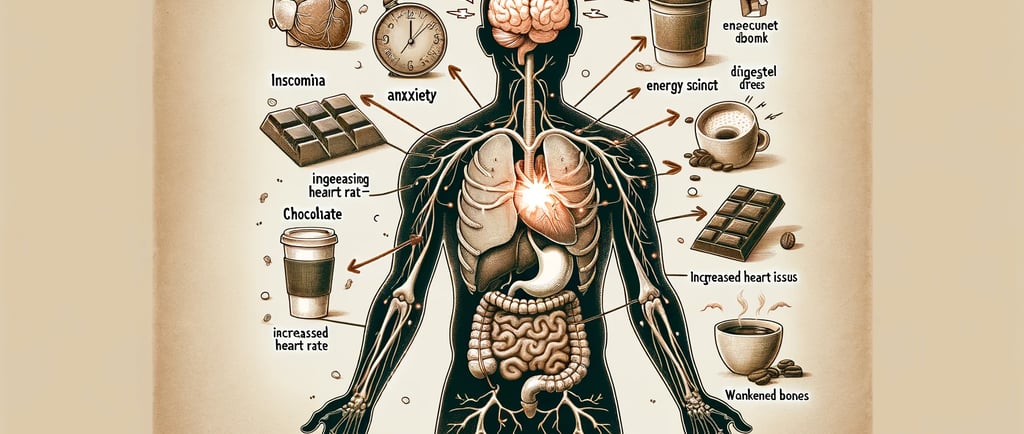The Ugly Truth About Caffeine
Effects of Caffeine
HEALTH


The Ugly Truth About Caffeine
Caffeine is one of the most widely consumed psychoactive substances in the world. Found in coffee, tea, energy drinks, and even chocolate, caffeine is often used to boost energy levels, improve focus, and enhance mood. While moderate caffeine consumption can offer certain benefits, excessive intake can have serious drawbacks. Understanding the ugly truth about caffeine can help you make more informed decisions about your consumption and manage its potential negative effects on your health.
How Caffeine Works
Caffeine acts as a central nervous system stimulant. It blocks the action of adenosine, a neurotransmitter that promotes relaxation and sleepiness, leading to increased alertness and reduced perception of fatigue. This stimulating effect is why caffeine is commonly used to stay awake and increase productivity.
Short-Term Effects of Caffeine
Increased Alertness: Caffeine can improve concentration and reduce feelings of tiredness, making it a popular choice for combating drowsiness.
Enhanced Physical Performance: By stimulating the release of adrenaline, caffeine can temporarily enhance physical performance and endurance.
Improved Mood: Caffeine consumption can boost mood and create a sense of well-being due to its impact on neurotransmitters like dopamine and serotonin.
The Ugly Side of Caffeine
While caffeine can offer short-term benefits, excessive and chronic consumption can lead to several adverse effects:
Insomnia: High caffeine intake, especially later in the day, can interfere with sleep patterns, leading to difficulties falling asleep and staying asleep. Chronic sleep deprivation can have severe health implications, including impaired cognitive function and weakened immune response.
Anxiety and Jitters: Caffeine increases the release of stress hormones like cortisol, which can lead to feelings of anxiety, restlessness, and jitteriness. This is particularly problematic for individuals with pre-existing anxiety disorders.
Digestive Issues: Caffeine can stimulate the production of stomach acid, leading to gastrointestinal discomfort, acid reflux, and stomach ulcers. It can also act as a diuretic, increasing the risk of dehydration.
Dependence and Withdrawal: Regular caffeine consumption can lead to physical dependence. Withdrawal symptoms, such as headaches, fatigue, irritability, and depressed mood, can occur when caffeine intake is suddenly reduced.
Increased Heart Rate and Blood Pressure: Caffeine stimulates the heart, potentially leading to an increased heart rate and elevated blood pressure. This can be dangerous for individuals with heart conditions or hypertension.
Bone Health: Excessive caffeine consumption can interfere with calcium absorption, potentially leading to weakened bones and an increased risk of osteoporosis.
Managing Caffeine Consumption
To enjoy the benefits of caffeine while minimizing its negative effects, consider the following tips:
Moderation is Key: Limit caffeine intake to moderate levels. The FDA suggests that up to 400 milligrams (about four 8-ounce cups of coffee) per day is generally safe for most adults.
Timing Matters: Avoid consuming caffeine late in the afternoon or evening to prevent sleep disturbances.
Know Your Sources: Be aware of all sources of caffeine in your diet, including coffee, tea, energy drinks, soda, and chocolate.
Stay Hydrated: Counteract caffeine's diuretic effects by drinking plenty of water throughout the day.
Monitor Your Reactions: Pay attention to how your body responds to caffeine. If you experience negative symptoms, consider reducing your intake.
Gradual Reduction: If you decide to cut back on caffeine, do so gradually to minimize withdrawal symptoms.
Conclusion
Caffeine, when consumed in moderation, can offer several benefits, including increased alertness and improved mood. However, excessive and chronic consumption can lead to a range of adverse effects, from sleep disturbances and anxiety to digestive issues and dependence. By understanding the potential downsides of caffeine and managing your intake wisely, you can enjoy its benefits without compromising your health.



